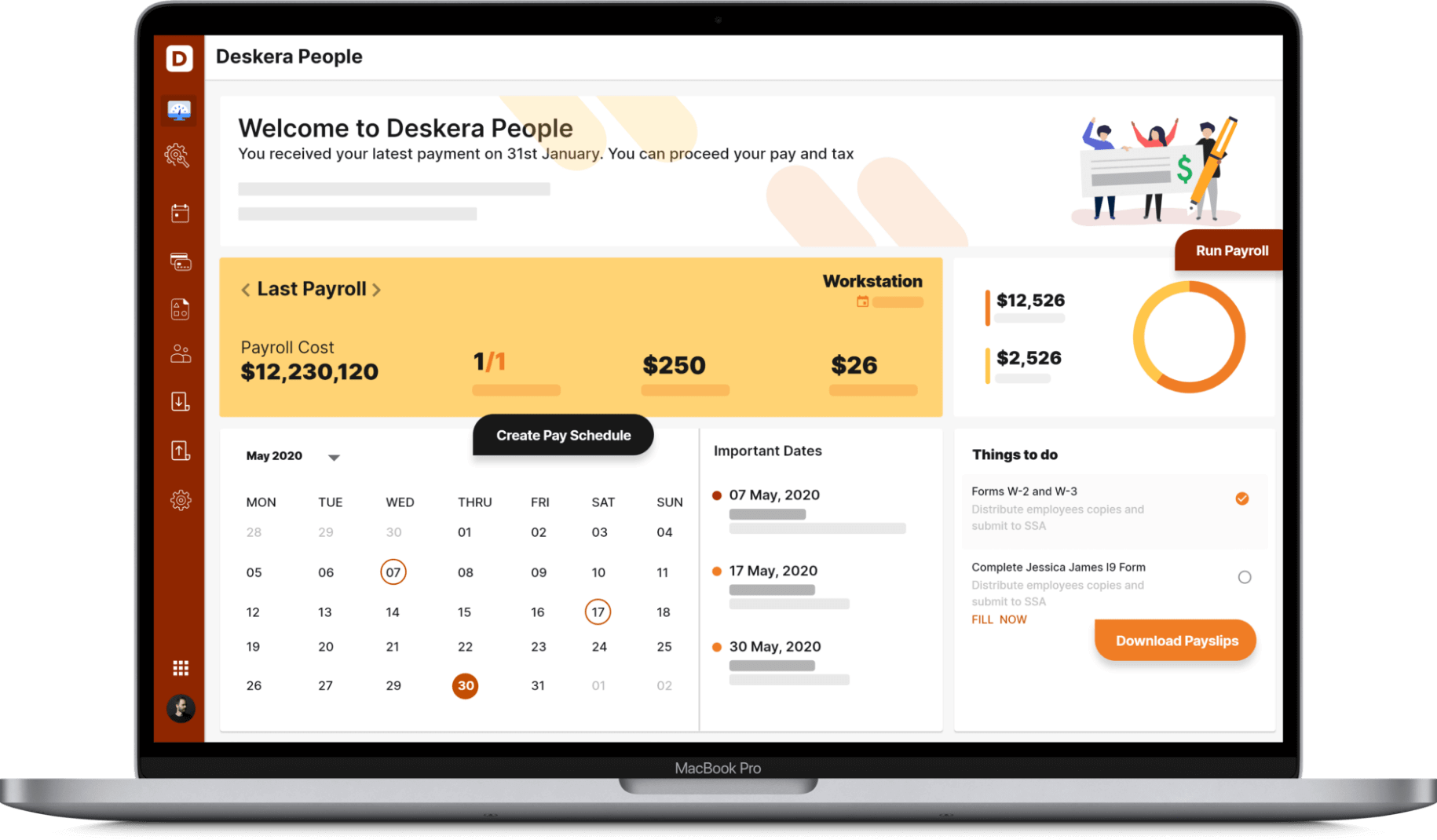New Jersey is that state in the United States which has the highest population density, highest percent urban population, and the densest system of railroads and highways. This is not it, for, at the global level, New Jersey has the maximum number of diners, the largest seaport, most shopping malls in one area, the tallest water tower, and the longest boardwalk.

This complexity of New Jersey is reflected in its payroll taxes as well, with all its local taxes, withholding requirements, and insurance taxes making it super confusing.
This article will help and guide you through these complexities by covering the following topics:
- New Jersey Taxes
- New Jersey Payroll Laws, Taxes, and Regulations
- New Jersey HR Laws that Affect Payroll
- New Jersey Payroll Forms
- Federal Payroll Forms to be Filed by New Jersey Employers and Employees
- New Jersey Payroll Tax Resources or Sources
- How Can Deskera Help with New Jersey Payroll Taxes?
- Key Takeaways
- Related Articles
New Jersey Taxes
New Jersey, aka the Garden State of the USA, has a progressive income tax system, with its income tax rates and income tax bracket being some of the highest in the United States. In fact, New Jersey charged state income taxes on all wages.
As an employer, it is also mandatory for you to withhold taxes and unemployment insurance quarterly for each of your residents and non-resident but working in the state employees. It does, however, have a reciprocity agreement with Pennsylvania.
What also needs to be kept in mind here is that the minimum wage in New Jersey is $12 per hour for most of the workers, and this is heading towards a $15 minimum wage per hour.
Additionally, New Jersey has a single, flat statewide sales tax rate which was decreased to 6.625% on January 1, 2018. There are, however, two exceptions to these flat sales tax rates. These are:
- If a purchase is made from a qualified business located in “Urban Enterprise Zones”, then they have a reduced sales tax rate of 3.3125%.
- Nearly all purchases in Salem County have a reduced sales tax rate of 3.3125% as well.
When discussing the property taxes imposed by the New Jersey state, they have the highest property tax rate in the country as their average effective property tax rate is 2.42%, which means that each year, homeowners pay almost 2.50% of their home value as property tax to the state.
New Jersey also has an inheritance tax rate that ranges from 11% and 16% is applicable to all the beneficiaries who are not in any of the following relations to the decedent: mother, father, spouse, civil union partner, grandparent, stepchild, child, grandchild, great-grandchild, and domestic partner. If the beneficiary is a sibling, close friend, or step-parents, they would have to pay the inheritance tax, though the initial $25,000 of the inheritance will be exempted from taxation.
Additionally, capital gains are also taxable under the New Jersey state laws, as they are treated as regular income, and therefore they are taxed at applicable rates in combination with other income. Lastly, New Jersey also collects taxes of $2.70 per pack of 20 cigarettes.
New Jersey Payroll Laws, Taxes, and Regulations
Irrespective of the state that you are based in, it is mandatory for you to follow federal law for income taxes, Medicare, Social Security, and Federal Unemployment Insurance (FUTA). In addition to these, the several state and local taxes that companies of New Jersey are obliged to pay are:
State Income Taxes
As per the New Jersey state income tax laws and regulations, it will be required of you to pay income tax withholdings from all state residents. This is applicable unless you are withholding another jurisdiction’s income tax at a rate that is the same or higher than New Jersey’s. Additionally, as an employer, you are also required to withhold state income taxes for nonresident employees.
Depending upon your income level, and considering that New Jersey has a progressive taxation system, it is important to know that their income tax rates are done in classes of seven or eight. The income tax rates of New Jersey start at as low as 1.4% on wages up to $20,000 and rise to 10.75%.
The 10.75% tax bracket became applicable from January 1, 2020, for all employees who are earning gross income between $1 million and $5 million, regardless of their filing status. This income tax rate was initially 8.97%.
As an employer, you are obliged to withhold income tax at the rate of 21.3% from salaries, wages, and other remuneration. This higher withholding is so that taxpayers can catch up as the increase is retroactive to January 1, 2020.
Note: The withholdings need to be filed quarterly, and the year-end filings must be done electronically.
Reciprocity Agreements
New Jersey has a reciprocity agreement and, therefore, laws with Pennsylvania. This means that if you have an employee who is a resident of Pennsylvania, then they will need to fill out Form NJ-165. Post this; you would not be required to withhold any New Jersey taxes.
Unemployment Insurance
New Jersey charges SUTA taxes as well. If you are an employer who has employed one or more individuals, and you pay wages of over $1,000 in a calendar year, then you would be subjected to New Jersey’s state unemployment taxes.
The exceptions to New Jersey’s state unemployment taxes are those employers who have employed agricultural workers or domestic workers and some non-profit organizations.
New Jersey’s SUTA taxes are based on a taxable wage base of $34,400, with the SUTA rates running from 0.5% to 5.8% for experienced employers.
The SUTA tax rates are calculated and assigned on a fiscal year basis, i.e., from July 1 to June 30. Your experience rate is your reserve balance- i.e., contributions paid minus benefits charged, divided by your average annual payroll.
If you are a new employer, you will be assigned a rate for the first three calendar years, post which your rate will be determined on the basis of your experience. In 2021, this assigned rate for the initial three calendar years of new employers was 2.7%.
In addition to having to pay SUTA taxes, the New Jersey payroll tax laws also require you to pay a state disability insurance rate, workforce development/supplemental workforce funds, and family leave insurance. However, these are usually as little as 0.0005%.
Note: When you pay New Jersey’s SUTA taxes, you may qualify for up to a 5.4% discount on your FUTA taxes.
Workers’ Compensation Insurance
All the employers of New Jersey are not covered by federal programs, and thus, you, as a New Jersey employer, need to have workers’ compensation insurance or qualify for self-insurance.
In order to self-insure, you will need to get approval from the Commissioner of the Department of Banking and Insurance. The approval of self-insurance is based upon the employer’s financial ability to meet its obligations under the law as well as the permanence of his or her business.
Minimum Wage Laws in New Jersey
Like several states of the United States, New Jersey too is moving towards increasing its minimum wage to $15 per hour. However, the minimum wage rates vary according to the type of job.
Thus, if you are an employer with less than six employees, then your minimum wage rate as per the New Jersey laws may be lower. In case you have tip-earning employees who are expected to make up part of their wage through their tips, you will still be obliged to pay a minimum wage regardless. Similarly, if you have farm employees who are doing piece-rate work for you, you would still have to pay them the minimum wage.
Exceptions to New Jersey’s Minimum Wage Laws are:
- Full-time students employed by the university that they are attending (they must earn 85% of the New Jersey’s minimum wage)
- Outside salespeople
- Motor vehicle salespersons
- Part-time employees caring for children in the employer’s home
- Minors under 18 not possessing a special vocational school graduate permit, with exceptions like service industries, farming, vocational school graduates, and light manufacturing.
- Employees of conferences, retreats, and summer camps that are operated by non-profit or religious organizations, are exempted from New Jersey’s minimum wages and overtime rates from June through September.
New Jersey Overtime Regulations
New Jersey does have overtime regulations as a part of its payroll. According to them, for any number of hours that an employer’s employee works over and above 40 hours in a workweek, they will have to be paid 1.5 times the regular wage paid by his or her employer.
The exemptions to New Jersey’s overtime regulations are:
- Executive
- Administrative
- Professional employees
- Farmworkers or those caring for livestock
- Limousine drivers
Different Ways to Pay Employees
While there are several ways of paying your employees, New Jersey permits you to pay by check or cash. If you want to pay through direct deposit, you will need the signed consent of your employee. However, considering that 7.1 million people in the United States do not have a bank account, you should be prepared not to rely on direct deposit as the mode of payment to your employees.
Pay Stub Laws
New Jersey’s pay stub laws state that you must provide a statement of deductions for each pay period to your employees. In fact, if you have employed ten or more employees, then your statement should also include hours worked, rate of pay, gross pay, and net pay. Additionally, New Jersey’s payroll rules have also made it mandatory for you to inform your employees in advance in case you are changing your pay rates.
Minimum Pay Frequency
New Jersey payroll rules have made it mandatory for you to pay your employees at least twice a month. The exception to this rule is executives and supervisors, who can be paid on a monthly basis.
As an employer, you do get the flexibility in deciding the days you pay on, as long as they are determined in advance and regular. If your payday happens to fall on a non-workday, then you will need to make your payments to your employees on the preceding workday. Additionally, make sure that you are paying your employees within ten days of the end of the work period.
New Jersey’s Paycheck Deduction Rules
As per New Jersey’s paycheck deduction rules, deductions are only allowed in specific circumstances and when authorized by contract or collective bargaining agreement. Some of those scenarios which allow paycheck deductions are:
- Employee welfare
- Insurance
- Profit-sharing plans
- Company oriented thrift plans
- Hospitalization
- Retirement funds or pension
- Employee savings accounts
- Employer loans
- Purchase of company products or safety equipment
- Labor union dues or fees
- Charitable contributions
- Child-care
- Health club memberships
- Rental or cleaning or work uniforms
Final Paycheck Laws of New Jersey
As per the New Jersey payroll laws, if you fire an employee, or if he or she leaves, then you are obligated to pay them their final paycheck before your next regular payday. The only exception to this rule is when there is a labor dispute involving payroll employees, in which case, you will have additional ten days to give your employee his or her final paycheck.
If your employees are on an incentive system and he or she is fired or leaves, then you can pay a reasonable approximation of their wages due until you can make an exact determination. The final paycheck needs to be paid through the regular channels of payment of wages, or if your employee requests so, then it can be mailed.
Accrued Paid Time Off
While New Jersey has no specific laws related to paid time off or vacation leave, it does require you to give your employees paid sick leaves. As an employer, you can give your employees either paid time off or a combination of paid vacation and paid sick leave. The current trend is moving in favor of paid vacation and sick leave.
Irrespective of what you choose to do about such accrued paid time off, make sure that you have specified it in your employee handbook. In this, you should also specify if there are any rules concerning non-sick leave paid time off, including use-or-lose policies and the ability to sell back leave.
Severance
New Jersey does not have any severance pay laws for firing or laying off individual employees; however, it does have rules for mass layoffs.
If you are an employer who has over 100 employees, and they work for around more than 20 hours per week, then under the New Jersey laws, you are obligated to give advance notice of layoffs.
If you are terminating the employment of over 50 employees, excluding your part-time employees, then your advance notice of layoff should be given 90 days in advance. Additionally, you must also provide severance pay equal to one week of pay for each full year of employment for each worker.
The exceptions to this rule are:
- If a worker is quitting
- If a worker is retiring
- If a worker is being fired due to misconduct
New Jersey HR Laws that Affect Payroll
While New Jersey’s HR laws are not very complex, they do carry strict fines and penalties for non-compliance. To help you avoid them, this section of the article is a must. New Jersey HR laws that affect payroll are:
New Jersey New Hire Reporting
Your new hires must be reported by you through the New Jersey Child Support Employer Services Portal. An alternative to this is you downloading a PDF form and mailing it to the agency at the address on the form. The reporting of your new hire or rehire must be done within 20 days of the date of hiring or rehiring as per federal law.
Paid Sick Leave
The New Jersey Payroll laws require employers to give all of their employees 40 hours of paid sick leave per year. A 12-month benefit year must be maintained for the same, which is not dependent on the employee’s anniversary date. The New Jersey payroll law has also mandated that the unused sick leave days be carried over to the next benefit year or paid out at the end of the current benefit year.
New Jersey Family Leave Act
The New Jersey Family Leave Act allows your employees up to 12 weeks’ family leave in a 24-month period without the threat of job loss. This act is applicable not to your employee’s health but rather only to the care of their family members. This can include:
- A leave of absence within a year of a child’s birth, adoption, or foster care to bond with the child.
- Caring for a sick family member with a serious health condition.
New Jersey’s Family Leave Act applies to:
- All employers who have at least 30 employees
- Employees who have worked for at least a year for their employers and at least 1,000 hours in the past 12 months.
Before availing their family leaves, an employee is required to give at least 15 days’ notice for intermittent leave, 30 days’ notice for consecutive leave for a child, “reasonable notice” for an ill family member, and as much notice as possible in cases of emergencies.
Note: You may also have to provide additional unpaid sick leave in accordance with the Federal Family and Medical Leave Act.
Lunch and Other Break Time Requirements
While there are no specific state laws in New Jersey regarding meals or other breaks, as an employer, you are obligated to follow the federal law for the same.
The federal law states that you should give paid short breaks to your employees, but not bona fide meal breaks where the employee is not doing any work. Usually, meal breaks are of 30 minutes or longer, though depending on the circumstances, they can be shorter.
In the case of your employees who are minors under 18, it is mandatory for you to give them a 30-minute lunch break if they have worked for more than five hours continuously.
Hiring Minors
The laws of New Jersey regarding the hiring of minors are complex due to the different work hours, requirements, and prohibitions depending on the age of the minor and the type of work.
This means that it has separate rules for children in theatrical occupations, street traders, and newspaper carriers. There are separate rules for hiring minors as employees in restaurants and bowling alleys during school or summer vacations, with the different rules even covering the hour restrictions.
However, in general, minors under 18 must have an employment certificate, and as an employer, you must keep a record of the same. While there are different rules and prohibitions for minor employees in factories, theaters, or newspaper carriers, some of the most general prohibitions are:
Note: Minors under the age of 16 are prohibited under the New Jersey hiring minor laws from working in and around power-driven machinery. This includes power lawn motors, but not cash machine conveyor belts found in stores. Additionally, minors are not allowed to work in certain chemical-type jobs like handling acids or dyes, mixing paints, or work that involves benzene exposure.
New Jersey Payroll Forms
Most of New Jersey’s payroll forms need to be filed online. While it does offer other filing methods, it is easy to find the forms in fillable PDFs online. New Jersey’s payroll and tax forms that must be filed by employers are:
New Jersey State W4 Form
New Jersey state W4 form is its withholding exemption form and is also known as NJ W-4. This form needs to be filled out by employees when they first take on a job and whenever they have a change in their exemptions. It is, therefore, an employee's withholding allowance certificate.
MW400, Employer Obligation to Maintain and Report Records
This form must be given to all your employees upon their hiring. This form describes your obligation as an employer to maintain and report records regarding benefits, wages, taxes, and other contributions.
NJ W-3M
These are income tax reconciliation forms of tax withheld and are best submitted electronically.
NJ-927, NJ-927W, and WR-30
These forms are filed electronically and are used to report unemployment insurance withholdings. These are the employer’s quarterly reports.
NJ-W-3-UNC
This is the Annual Reconciliation of Gross Income Tax Withheld from Unregistered Unincorporated Contractors.
NJ-W-4P
This is the certificate of voluntary withholding of gross income tax from pension and annuity payments.
NJ-927-H
Filed online, this is the domestic employer’s annual return form.
NJ-W-3M
This is a form of Gross Income Tax Reconciliation of Tax Withheld
Supplemental NJ-WT
This is the Gross Income Tax Supplemental Withholding Tables
GMB-5
This is the monthly report of New Jersey Gross Income Tax Withheld from Gambling Winnings.
NJ-550
This is the monthly return form of Withholding from Unregistered Unincorporated Contractors.
NJ-WT
This is the New Jersey Gross Income Tax Instruction Booklet and samples for employers, Payors of Pension and Annuity Income, and Payors of Gambling Winnings.
DCC-1
This form is for requesting copies of previously filed tax returns.
NJ-EFW2
This has the specifications for reporting New Jersey W-2 information via electronic filing.
M-6025
This has the W-2 sample reporting guidelines.
NJ-W-3G
This form is for the year-end reporting and is the Gross Income Tax Schedule for computing the amount withheld from employee wages and gambling winnings.
Federal Payroll Forms to be Filed by New Jersey Employers and Employees
In addition to the New Jersey state payroll forms, the federal payroll forms to be filed by New Jersey employers are:
- W-4 Form: Form W-4 is to help you calculate taxes to withhold from employee paychecks.
- W-2 Form: The W-2 form is for reporting total annual wages earned (one per employee)
- W-3 Form: W-3 form reports total wages and taxes for all employees
- Form 940: Form 940 reports and calculates unemployment taxes due to the IRS
- Form 941: Form 941 is used for filing quarterly income and FICA taxes withheld from paychecks.
- Form 944: Form 944 is used for reporting annual income and FICA taxes withheld from paychecks.
- 1099 Forms: 1099 Forms are used for providing non-employee pay information that helps the IRS to collect taxes on contract work.
New Jersey Payroll Tax Resources or Sources
The New Jersey payroll tax resources or sources are:
- New Jersey Income Tax Withholding Instructions: This will be your guide explaining to you how to calculate and file taxes, executions, and special rules.
- New Jersey Division of Taxation: This holds information on all types of taxes, including corporate taxes. It also has the link for filing the forms of these taxes.
- New Jersey Wage and Hour Compliance: This contains the information and flyers about wage and hours rules.
- New Jersey Family Leave Act Information Sheet: This has all the information regarding NJFLA for the employers as well as employees.
- New Jersey Child Labor Form: This includes all the basic regulations by occupation and age, broken down for employers or employees.
- New Jersey Employer’s Handbook: This includes everything that you need to know about unemployment, disability, and workforce development programs.
How Can Deskera Help with New Jersey Payroll Taxes?
Deskera People is a cloud-based HR software that will not only automate but also run your payroll for you once you have completed your portion of work in the following three easy steps:
- Add employees
- Select the amount
- Pay them

This software comes equipped with features that will let you choose your own payroll schedules. You would thus be able to pay your different groups of employees according to their different payment schedules like weekly, semi-monthly, monthly, etc.
Deskera People also facilitates robust employee management. From its dashboard, you can click on any of your employees to view their personal details, components, and compliance. In fact, to get better insights into your payroll, it also generates payroll reports that will also cover your payroll tax obligations.
Key Takeaways
New Jersey is that state in the United States which charges state income taxes on all wages from $1 to millions. Additionally, it also requires state unemployment and workers’ compensation insurance if you are an employer with more than one employee.
However, the HR and payroll rules of New Jersey are straightforward. With no break or PTO regulations, the state has mandated paid sick leaves or a combination of paid vacation and sick leaves. In the case of its rules for hiring minors as employees, the rules are more varied than those of other states.
All in all, considering the various state and local payroll taxes that are imposed on the New Jersey employers in addition to the federal taxes, with its accompanying exceptions and exemptions and their eligibility, payroll processing in New Jersey tends to be a tedious process.
However, what is vital through all of it is carrying out the process as efficiently as possible so as to avoid penalties and ensure tax compliance. This can be ensured by using software like Deskera People, that are equipped to automate payroll processing and has inbuilt statutory and tax compliances for the USA and its states.
Related Articles















